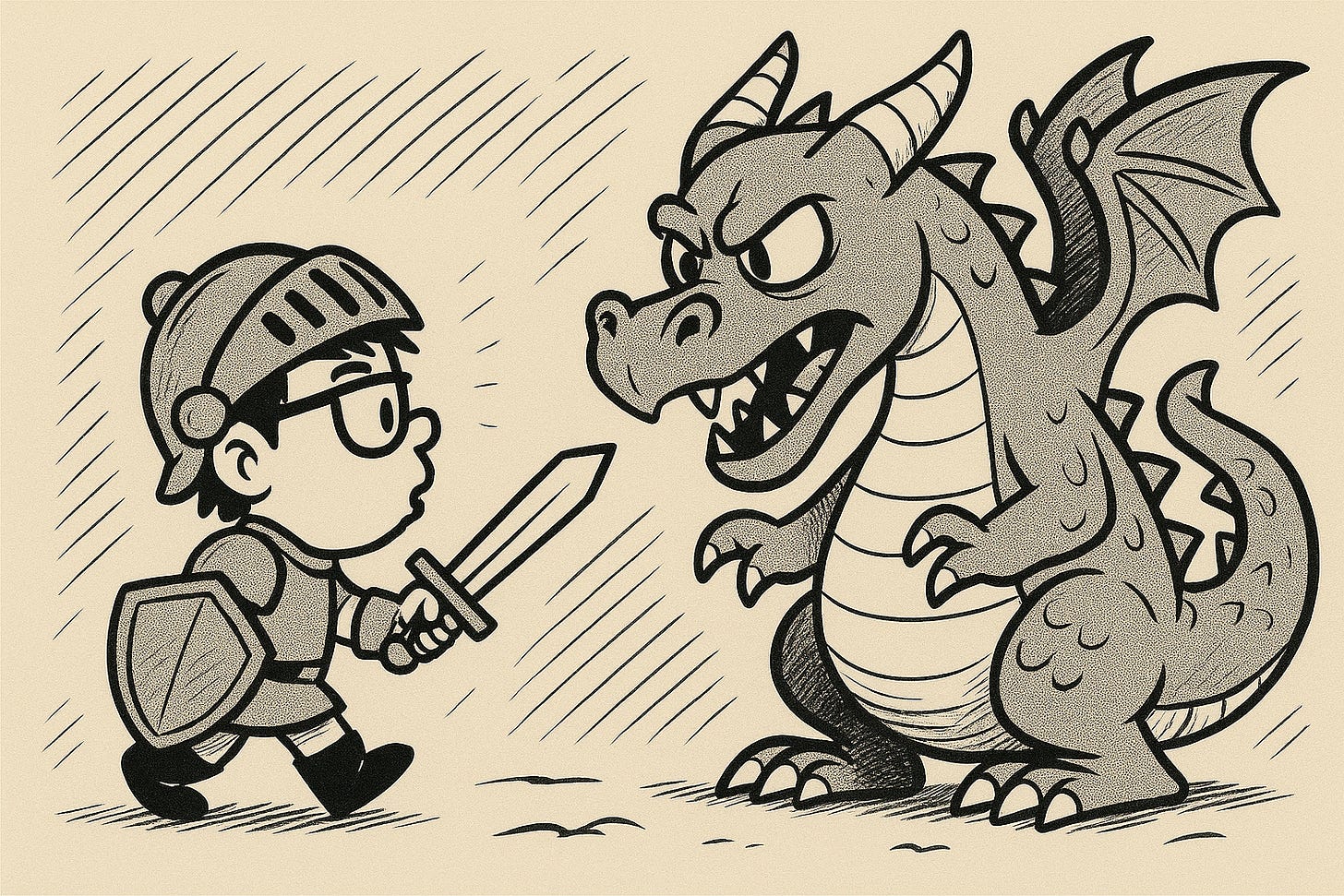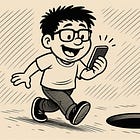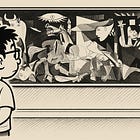From Hyper-Discipline to Adventure: A Questful Approach
Small adventures that build real consistency
I know I’ve told you folks before that this past year has been a wild one for me: a year of growth, big changes, and exciting news about what I’m building.
One area I’ve been focusing on is public speaking. If I want to spread the word about Adaptable Discipline, I know I need to master this skill, especially as a non-native English speaker.
To share a message about a different kind of discipline, I need to communicate clearly and confidently, so I’ve been seeking out people and opportunities to help me get there.
That’s how I met Danielle Krage. I initially reached out to Danielle for guidance on public speaking since she has years of experience preparing people to speak with clarity and confidence. She kindly responded, and we connected. During our conversation, she shared that she’s no longer coaching and is now fully immersed in a fascinating new project: Questful World (https://www.questful.world), personal and deeply intentional journeys she calls Quests.
Her ideas about Quests immediately grabbed my attention. They felt deeply aligned with the philosophy of Adaptable Discipline, and I knew they would resonate with this community. So, I invited her to collaborate on this piece to share her vision of Quests and how they can help us strengthen our own journey with discipline.
She kindly agreed, and now she’s here to tell us her story.
I’ll let her take it from here.
💡 Turn this into action: Paid Companion →
Self-discipline dialled up to twelve
One of my earliest memories is being made to sit at the ‘naughty table’ at my school—not because I’d been ‘naughty’, but to set a good example to the other kids. (This did not win me any friends!)
I was SO GOOD. Freakishly good.
I got straight A’s. I won a scholarship.
Self-discipline morphed into perfectionism. Don’t slip up! Never slip up!
Was it sustainable? Nope.
Am I now an easy-breezy, loosey-goosey person who doesn’t care about goals? Also nope.
It’s been a process, but in the last three years I’ve found an approach to goal setting and building new habits that’s been life-changing—I don’t say that lightly. I’ll share what’s changed, in case any part of it helps you.
What’s changed?
I developed the idea of doing Quests. I’m now on my fourth. These have looked like—writing 52 short stories in a year, interviewing 52 people about narrative comedy, and reading a poem, short story, and essay a night for 1000 nights. As I write this, I’m 7 weeks into my latest Quest: to go to 100 places, and spend 3 pages describing them.
When I talk to people about them, I get a lot of different responses, but one of the most common ones is: You must be so disciplined! I could never do that.
What’s interesting is that, with the deliberate framing I now have around doing Quests, it’s SO FUN. I’ve been able to bring flexibility, ease, and adventure—in a way that my rigid, self-monitoring self could never have imagined.
Since May, I’ve been helping other people to do the same, and it’s been a delight to see it work for them too.
So, What’s a Quest?
I define a quest as:
A journey or mission undertaken by a person to reach a specific endpoint, often involving challenges, obstacles, and personal growth along the way.
It has some particular flavours. We’re talking…
Self-direction vs institutional structure
High degree of intrinsic purpose vs specific external certification/validation
Unique journey vs conventional path
Emergent outcomes vs heavily pre-determined
It also has strong design elements. These include:
A purpose and endpoint
Likelihood of a transformative journey
An exciting level of challenge
A sense of meaningful accomplishment
I’ll dig into a couple of these elements, through the lens of my latest Quest (100 places, 300 pages), by way of example.
Having a Purpose and Endpoint
Let’s start with the end
Having a clear endpoint to my Quests has been incredibly helpful. It contains it as a fun experiment, just one that I choose to do over an extended period of time.
In this case, I’ve made a single commitment—to go to 100 places, and spend 3 pages describing them. Now my only job is to do this in as fun and flexible a way as possible. One that truly fits with my schedule and life.
It could just as well have been 10 places, as a shorter experiment; I’ve been helping people create Mini-Quests.
Either way, it creates an intentional frame.
The purpose. The why behind it…
I’m now also very intentional about getting clear on my purpose. Previously, I’d often fall into the trap of setting a goal, breaking it down, and then just trying to get it done! So much ticking things off lists, while longing for the relief of the finish line.
Not so with these Quests. I’ve developed a design process that helps me think through what I truly want to do, WHY, and in what way.
With the 100 places Quest, my motivation looks like:
Wanting to get better at ‘setting’ as a writer. (My attention naturally goes to people, not places.) Finding a fun, easy way to practice this.
Wanting a fun prompt to get out of the house and experience new sights, sounds and smells. (I work remotely. A lot of time sitting at my desk.)
This combines into a wonderful, varied and flexible adventure. For example, this week my place was ‘inside an Amazon Warehouse’. (I had no idea that you could do guided tours!) It’s also been the view from my own deck, and an unplanned visit to a hospital waiting room. Flexible. Fun. And seven weeks in, I’m already experiencing so many benefits.
Room for surprise
I love this quote from Lois McMaster Bujold:
‘The most important thing about quests, he decided, was not in finding what you went looking for, but in finding what you never could have imagined before you ventured forth.’
It’s fun designing a Quest that has this kind of space. Aiming for 100 places, 300 pages has enough structure to keep me moving forwards, consistently, but also so much room to explore. And importantly, I get to enjoy all of the journey. It’s my journey. I can adapt it in any way that I want, safe in the knowledge that I will, for sure, complete it.
At the same time, I’m already developing new writer habits—I’m observing the physical world in ways that I hadn’t before. And I’m loving experimenting with how to get that onto the page.
My experience has been an entire process that feels alive, rewarding and energising. This matches the feedback from people I’ve helped to design and complete their own Quests.
So, maybe there’s a skill or interest that you’d like to develop as a Quest?
You could start by asking yourself this question.
What’s a skill or interest I might like to explore, if I knew that it could be fun?
Final high-five to you
Thanks to Camilo for having me, and to you for reading this. Here’s to the good kind of self-discipline. The kind that has you showing up for yourself—not to be good or perfect, but to grow through a fun adventure. A Quest.
Danielle Krage is a Writer, Coach, and Creator of Questful World.
Thank you, Danielle, for sharing your wisdom with us. I think the concept of a Quest will feel fresh and inspiring to many readers here.
As you know, I’ve always shared my own journey with self-discipline: the whole reason this newsletter began was to document my personal growth so I could leave a legacy for my kids.
Over time, that simple journey grew into something bigger. Looking back, I’d say that journey itself could be seen as a Quest. Danielle can correct me if I’m wrong.
🔥 Make the return faster — Start the practice →
In my case, there wasn’t a clear timeframe; it’s more like a continuous Quest that has branched into many directions over this past year. But at its core, it has always been about building discipline from the inside out, and that focus has already started expanding to serve others as well.
That’s why I think Danielle really nailed it with her definition of a Quest. These structured adventures, whether short or long-term, are powerful tools for building discipline. In the context of Adaptable Discipline, they give us a framework for practicing consistency, making space for drift, and — most importantly — training ourselves to come back faster when we fall off track.
Not every Quest will go perfectly. Some might reveal that the goal wasn’t quite right, or that it needs adjusting. But each one is an opportunity to refine your criteria, strengthen your systems, and make discipline a sustainable part of your life. Quests keep growth exciting while teaching you how to stay steady.
Before closing, here’s my question to you:
What’s the most fun Quest you’ve ever taken on, and what helped you see it through (or is helping you now)?
Have a wonderful week!
✨ Ideas Worth Exploring
If this piece resonated, here are a few more that go hand-in-hand.
Enjoying this? Support the mission.
I write Self-Disciplined to help more people build real, lasting discipline — without burnout. If my work has helped you, consider supporting it with a coffee or becoming a member.









Very good deep insight about quest👌
What a novel idea, and the name "quest" is perfect! I look forward to following your journey, Camilo. It sounds exciting :))